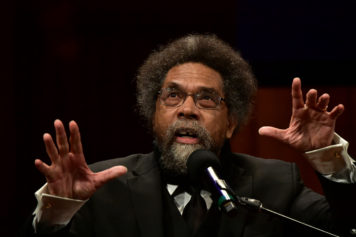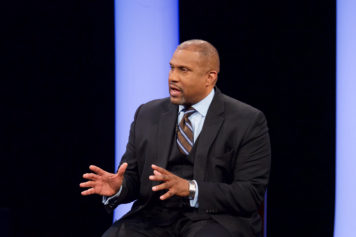With President Barack Obama sworn in, it’s time to return to a more pressing matter: The bitter in-house dispute between Tavis Smiley, Cornel West and half of black America.
One would think those long-simmering tensions would begin subsiding now that the first black president’s final term is freshly secured. Yet the very public debate over Obama’s handling of his first term remains intense – vicious even – and for all the wrong reasons.
For some time now, Smiley and West have loudly complained that the president is insensitive to the plight of the poor. In fact, the condemnations continued right on up to Inauguration Day.
West, a scholar and activist, was quoted in The New York Times, as usual, spewing venom at Obama. This time, West objected to the president using Martin Luther King Jr.’s Bible during his swearing-in ceremony. King, he said, fought fiercely for the downtrodden while the president “has a compromising kind of temperament.”
Not to be outdone, black defenders of Obama continue firing attacks at West and Smiley, a radio talk show host and businessman. In a recent article, submitted to Atlanta Black Star, one blogger even sought to tie Smiley to a multimillion dollar settlement, which Wells Fargo Bank agreed to pay for discriminating against blacks and Hispanics.
Granted, Wells Fargo has sponsored some of his ventures, but Smiley has not been implicated in the discrimination case.
That didn’t seem to matter to Eric L. Wattree. He wrote: “What makes it particularly ironic that Tavis Smiley would be associated with this scheme to target poor and middle-class minorities is that Smiley is the primary promoter of what he calls “The Poverty Tour,” along with his friend and associate, former Princeton professor, Cornel West.”
All this bickering would be well worth ignoring except for this: It distracts from substantive issues that Smiley and West were trying to make in the first place. In addition to charging that Obama has routinely snubbed the poor, West and Smiley insist the president has been attentive to gays, women and Latinos, while discounting African-Americans, his most loyal constituency.
By my measure, those are valid points to be considered. So why have we not been engaging in substantive debate?
The explanation is at once simple and complicated.
One reason blacks are so protective of Obama relates to the power of race and symbolism. As the first black president, Obama serves as a living monument to African-American achievement and pride.
And then there is this: Since day one of his first term, the president and his entire family have been subjected to unrelenting attacks, even by white colleagues on Capitol Hill.
Why, then, the reasoning goes, should blacks toss more gasoline on that racist fire?
Timing is another factor that has led African-Americans to rebuff complaints leveled by Smiley and West. Understandably, blacks have been reluctant to give voice to frustration with the president, especially during election seasons when public criticism could cost him a race.
As it relates to Smiley and West, style has been an influence, too. No one can deny that they are committed to the welfare of African-Americans. At times, though, both men have appeared clumsy and mean-spirited in making the case that blacks – like every other interest group – should both assess and demand something of their president. In that sense, Smiley and West have undercut the substance of their own critiques by feeding the perception that they are petty and ego-driven.
For instance, Smiley first began criticizing Obama years ago, when he failed to attend Smiley’s State of Black Union event. For his part, West blasted Obama because he couldn’t get extra tickets for the 2009 inauguration.
Worst still, West in particular went over the top with his reference to Obama as a blackface caricature. That was needlessly disrespectful. It served as yet another lightning rod for discourse about anything but Obama’s job performance.
The most disturbing aspect of the whole family circus relates to blacks’ willful blindness. West and Smiley aside, some African-Americans won’t tolerate any critique of Obama, no matter the merit or source.
I happen to agree with West and Smiley’s point that Obama has practically ignored the poor. That’s not an endorsement of those two men. It is an acknowledgment of the need for blacks to be more politically astute.
The fact is, Obama is a politician, not a preacher or an activist. History has shown that any group that bestows blind trust on an elected official does so at its own peril.
Remember how cozy we got with saxophone-playing Bill Clinton? Even as blacks fondly referred to him as the first black president, “Slick Willie” did more back-room damage to African-Americans than most people will ever know.
With Obama’s final term underway, all of this in-house squabbling may soon be rendered moot. In remarks made during his inauguration speech, Obama seemed to signal a political shift. For the first time in his presidency, I actually heard him say it: He said the nation has an obligation to help the poor.
Moving forward, let’s hope he also feels free to take more assertive action regarding blacks and issues such as discrimination and the flawed criminal justice system.
Maybe then Smiley and West will settle down. And the rest of us can watch and – Lord knows – assess.


